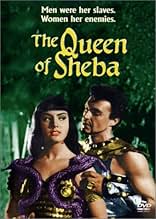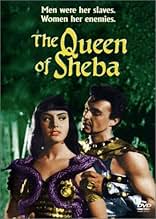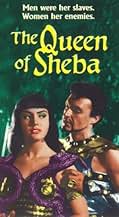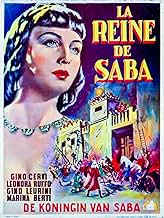Aggiungi una trama nella tua linguaThe Queen of Sheba falls in love with the King of Israel. The King of Israel, however, is in love with someone else.The Queen of Sheba falls in love with the King of Israel. The King of Israel, however, is in love with someone else.The Queen of Sheba falls in love with the King of Israel. The King of Israel, however, is in love with someone else.
- Regia
- Sceneggiatura
- Star
Recensioni in evidenza
Remade , some years later ,by Henry King ,as "Solomon and sheba " ,starring Yul Brynner and Gina Lollobrigida as the temptress who allowed herself an orgy : the pagan queen finally embraced the "true " God.
In the Bible ,only a few lines are given over to Sheba ;her life is reportedly more detailed in the Coran,and she's referred as Balkis in it,as in the Italian movie.
In spite of some plot holes, the Italian movie compares favorably with the big budget American superproduction ; there's only one scene shared by both versions: the obligatory famous judgement of Solomon concerning the two mothers .
Solomon 's time on the screen is rather short,leaving the lion's share to his son Roboam (who ,historically, would be Solomon's and Sheba's son) ,who meets the queen who has a bath incognito in an oasis (the famous waterfalls which you can see in almost every Italian sword and sandal /peplum film) and naturally it's love at first sight.Roboam and his mate use a pseud to enter her town ,and when she discovers she 's been cheated , the queen declares war to Solomon.Historically ,Solomon's reign was peaceful and prosperous ,but his 700+wives and lovers and his tolerance with the Pagan religions provoked an angry response from the petulant Jehovah at the end of his reign.
The siege scene is well directed and helps the queen find both true love and true faith .
It had not been the only time an Italian black and white peplum was remade as a cinemascope/color epic : they remade Freda's "Spartacus"(1952) ,which ,in spite of Kubrik's film reputation, deserves to be seen.
In the Bible ,only a few lines are given over to Sheba ;her life is reportedly more detailed in the Coran,and she's referred as Balkis in it,as in the Italian movie.
In spite of some plot holes, the Italian movie compares favorably with the big budget American superproduction ; there's only one scene shared by both versions: the obligatory famous judgement of Solomon concerning the two mothers .
Solomon 's time on the screen is rather short,leaving the lion's share to his son Roboam (who ,historically, would be Solomon's and Sheba's son) ,who meets the queen who has a bath incognito in an oasis (the famous waterfalls which you can see in almost every Italian sword and sandal /peplum film) and naturally it's love at first sight.Roboam and his mate use a pseud to enter her town ,and when she discovers she 's been cheated , the queen declares war to Solomon.Historically ,Solomon's reign was peaceful and prosperous ,but his 700+wives and lovers and his tolerance with the Pagan religions provoked an angry response from the petulant Jehovah at the end of his reign.
The siege scene is well directed and helps the queen find both true love and true faith .
It had not been the only time an Italian black and white peplum was remade as a cinemascope/color epic : they remade Freda's "Spartacus"(1952) ,which ,in spite of Kubrik's film reputation, deserves to be seen.
Entitled "The Queen of Sheba" on the DVD or video versions in the U.S., this is a well budgeted effort in the long-tradition of cinematic sword and sandal movies. Indeed, this genre of movie began in Italy almost a half century before. The Italian school of cinema put out some grand ancient-world epics before "going to seed" in the late 50's and 60's. So, "Sheba" is right on the cusp of this. Production values are quite good--costumes and sets. Most of the acting is tepid to poor, and the battle/fight scenes are slack; therefore, the script's hokeyness is not concealed. Still, "Sheba" is interesting viewing for a movie buff into sword and sandal flicks. A partial saving grace--it's not too long!
In ancient Israel King Salomon whose wisdom and benevolent rule is seen as a threat to more tyrannical monarchs in the region . Solomon is wise and rules his kingdom well. King Salomon (Gino Cervi) names his younger son, Rehoboam (Gino Leurini), his heir and sends him on a spy assignment to Sheba . But he slowly falls in love with the Queen(Leonora Ruffo) . In fact, the Queen is in league with other kingdoms and her aim is to divide the twelve tribes of Israel . Over time however, she too falls in love with Rehoboam choosing to side with him against the priests . The luscious Queen of Sheba falls in love with the King of Israel's son , Rehoboam , however, he is in love with someone else ,Zamira (Marina Berti who played Quo Vadis as Petronio's gorgeous slave) , daughter's King of Tiro . The Queen thinks Rehoboam has double-crossed her and influenced by Kabaal (Franco Silva), commander of the Sheban army attacks the city of Jerusalem . The Queen of Sheba royally ticked off , invades Israel King but Rehoboam attempts to prevent a war between their two countries .
This is an early Peplum with drama, court intrigues , a love story and spectacular battles , but not brain food .Don't look for too much of a screenplay, because the emphasis is on lavish spectacle . Lousy performances in theatrical style with lots of gesticulation .As usual in Peplum films appears the choreographic girls dancers and lots of action with several adventures including spectacular fights , impressive sets and some good effects . The sets and production design impress too .The film contains an evocative and spectacular music by Nino Rota -The Godfather- well conducted by Franco Ferrara . This elaborate recounting is regularly directed by Pietro Francisci though with little relation with the Biblic events . Francisci was an expert on Peplum as he proved in 1963 Ercole sfida Sansone , 1960 Saffo, Venere Di Lesbo ,1960 The battle of Siracusa ,1959 Hércules unchained and particularly 1958 Hércules with the great Steve Reeves . Fun for the whole family though it tends toward the ponderous at times but for the most part, it's an average movie .
This is an early Peplum with drama, court intrigues , a love story and spectacular battles , but not brain food .Don't look for too much of a screenplay, because the emphasis is on lavish spectacle . Lousy performances in theatrical style with lots of gesticulation .As usual in Peplum films appears the choreographic girls dancers and lots of action with several adventures including spectacular fights , impressive sets and some good effects . The sets and production design impress too .The film contains an evocative and spectacular music by Nino Rota -The Godfather- well conducted by Franco Ferrara . This elaborate recounting is regularly directed by Pietro Francisci though with little relation with the Biblic events . Francisci was an expert on Peplum as he proved in 1963 Ercole sfida Sansone , 1960 Saffo, Venere Di Lesbo ,1960 The battle of Siracusa ,1959 Hércules unchained and particularly 1958 Hércules with the great Steve Reeves . Fun for the whole family though it tends toward the ponderous at times but for the most part, it's an average movie .
This early and obscure Italian spectacle was among the first (in a long line of) Biblical films to emerge after the long-dormant subgenre received a massive shot in the arm from the box-office and critical success of the colossal Hollywood remake of QUO VADIS the previous year. Tellingly, it was directed by Pietro Francisci who, 5 years down the line, would himself kick-start (with HERCULES) a seemingly never-ending stream of endearingly hyperbolic sword-and-sandal epics that mostly elicited derision from critical circles but also a solid base of hardcore fans worldwide. Having said that, in the interim there were epics made in Italy – like Francisci's own ATTILA (1954), ULYSSES (1954) and a few more I hope to get to watch in this month-long genre retrospective I embarked upon – but none of them caught audiences' fancy like Steve Reeves' star-making turn did...
While I do not wish to accord the film under review (that also employs the later celebrated names of composer Nino Rota and costume designer/co-screenwriter Vittorio Nino Novarese) any undeserved claims of being a lost classic or something, I have to admit that I was genuinely surprised by how efficiently made and effortlessly enjoyable it turned out to be. Despite being shot in monochrome, it hardly feels half-hearted or cut-rate – in contrast to some of the later efforts in similar vein, I might add – and, while not exactly action-packed, it delivers in that field as well: from the slaying of a snake slithering threateningly down a tree to a skill-testing race between a love triangle(!) and from the wrestling bout in a tavern to the climactic assault on Israel – complete with the be-all-and-end-all duel between the respective champions of the two factions (to which this adds an effective if predictable twist). Then there is even one final arrow-shooting confrontation in a deserted valley between the aforementioned love triangle that also brings true the hitherto-thought impossible Sheban prophecy of their Queen not being permitted to love until the mountain moves (which could be straight out of Shakespeare's "Macbeth" for all I know)!
The cast, then, is a likable mixture of recognizable and new faces: on the male side, we have Gino Cervi (top-billed but his role as a bemused King Solomon is subservient to the younger generation; obviously enough, he is introduced at the start of the film while presiding in his court over the famous "dueling mothers" case), Gino Leurini (as his impulsive son Rehoboam), Franco Silva (as his rival in love and war Kabaal) and Umberto Silvestri (as Leurini's equally free-spirited lieutenant); conversely, the opposite sex is represented by Leonora Ruffo (looking decidedly stunning in the title role and also handling the more sensitive moments required of her quite decently), Marina Berti (having appearing in a key role in QUO VADIS, she is here relegated to the sidelines as the appropriately jilted intended of Rehoboam but, at least, she looks good too) and Dorian Gray (as Ruffo's handmaiden who also falls for Silvestri's charms).
If I had to criticize the film – which also served as a belated tribute of sorts to Gray who, tragically, took her own life earlier this year – it would be in the script department since it tends to repeat itself once too often when it comes to the various romantic intrigues, and is also clearly partial to the cause of the Israelites since it has them rout the spies in their midst immediately but depicts the Shebans taking the longest time to do likewise to our two heroes (despite their incognito names being as Jewish as they come: Abner and Eli)! I don't recall the later Hollywood spectacle SOLOMON AND SHEBA (1959) well enough to say if there had eventually arisen in it an amorous conflict between father and son over the luscious queen but this modest Italian peplum (which ends with the two young lovers' triumphant embrace under Solomon's paternal gaze) should provide a satisfactory alternative to that elephantine retelling of the tale.
While I do not wish to accord the film under review (that also employs the later celebrated names of composer Nino Rota and costume designer/co-screenwriter Vittorio Nino Novarese) any undeserved claims of being a lost classic or something, I have to admit that I was genuinely surprised by how efficiently made and effortlessly enjoyable it turned out to be. Despite being shot in monochrome, it hardly feels half-hearted or cut-rate – in contrast to some of the later efforts in similar vein, I might add – and, while not exactly action-packed, it delivers in that field as well: from the slaying of a snake slithering threateningly down a tree to a skill-testing race between a love triangle(!) and from the wrestling bout in a tavern to the climactic assault on Israel – complete with the be-all-and-end-all duel between the respective champions of the two factions (to which this adds an effective if predictable twist). Then there is even one final arrow-shooting confrontation in a deserted valley between the aforementioned love triangle that also brings true the hitherto-thought impossible Sheban prophecy of their Queen not being permitted to love until the mountain moves (which could be straight out of Shakespeare's "Macbeth" for all I know)!
The cast, then, is a likable mixture of recognizable and new faces: on the male side, we have Gino Cervi (top-billed but his role as a bemused King Solomon is subservient to the younger generation; obviously enough, he is introduced at the start of the film while presiding in his court over the famous "dueling mothers" case), Gino Leurini (as his impulsive son Rehoboam), Franco Silva (as his rival in love and war Kabaal) and Umberto Silvestri (as Leurini's equally free-spirited lieutenant); conversely, the opposite sex is represented by Leonora Ruffo (looking decidedly stunning in the title role and also handling the more sensitive moments required of her quite decently), Marina Berti (having appearing in a key role in QUO VADIS, she is here relegated to the sidelines as the appropriately jilted intended of Rehoboam but, at least, she looks good too) and Dorian Gray (as Ruffo's handmaiden who also falls for Silvestri's charms).
If I had to criticize the film – which also served as a belated tribute of sorts to Gray who, tragically, took her own life earlier this year – it would be in the script department since it tends to repeat itself once too often when it comes to the various romantic intrigues, and is also clearly partial to the cause of the Israelites since it has them rout the spies in their midst immediately but depicts the Shebans taking the longest time to do likewise to our two heroes (despite their incognito names being as Jewish as they come: Abner and Eli)! I don't recall the later Hollywood spectacle SOLOMON AND SHEBA (1959) well enough to say if there had eventually arisen in it an amorous conflict between father and son over the luscious queen but this modest Italian peplum (which ends with the two young lovers' triumphant embrace under Solomon's paternal gaze) should provide a satisfactory alternative to that elephantine retelling of the tale.
I think the fact that this is in black and white helps it enormously. So often the poor quality of the image distracts from these Italian-made adventure films and tends to render them all but unwatchable. This one benefits also from decent story to underpin the, admittedly, pretty mediocre acting. The young prince "Rehoboam" (Gino Leurini) finds himself posing as an agent of Gad (not God) at the court of the legendary Balkis, Queen of Sheba (Leonoro Ruffo) who has sworn never to feel the touch of man. Of course the two fall in love, much to the chagrin of her army commander "Kabaal" (Franco Silva) and from now on in, the film follows a fairly predictable route of deceit, revenge and plotting. I could have done with a little more action and Leurini looks faintly ridiculous with a moustache that looks more like an early example of botox gone wrong; but the whole thing is actually quite well paced with some decent attention to the look of the film. The ending is a bit flat - be warned, but it passes 90 minutes amiably enough.
Lo sapevi?
- QuizLeda Rivarolo's debut...
- ConnessioniReferenced in Il bacio dell'assassino (1955)
I più visti
Accedi per valutare e creare un elenco di titoli salvati per ottenere consigli personalizzati
Dettagli
- Data di uscita
- Paese di origine
- Lingua
- Celebre anche come
- The Queen of Sheba
- Azienda produttrice
- Vedi altri crediti dell’azienda su IMDbPro
- Tempo di esecuzione
- 1h 50min(110 min)
- Colore
- Mix di suoni
- Proporzioni
- 1.37 : 1
Contribuisci a questa pagina
Suggerisci una modifica o aggiungi i contenuti mancanti






























